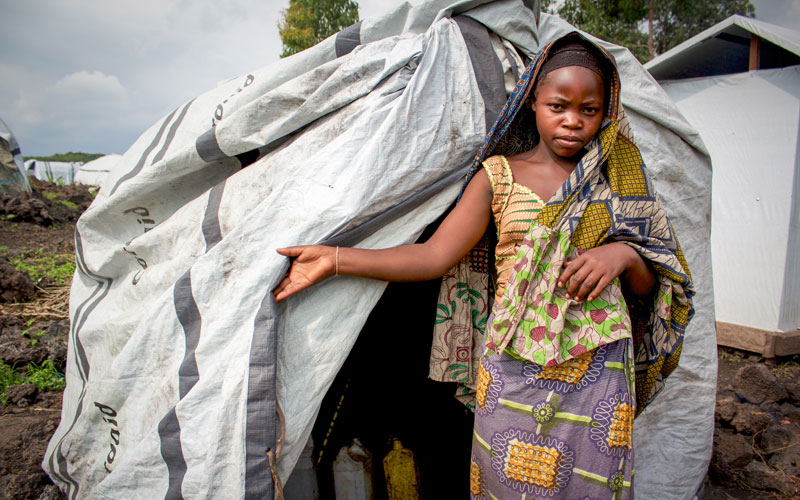Muombi, 15, lives with friends in the Mugunga 1 camp for internally displaced persons (IDP) several miles outside of Goma in eastern Democratic Republic of Congo.
She was separated from her mother when her family fled fighting in their village.
"My mother ran away,” says Muombi. “I don't know where she went. The last time I saw her was during the war. I was taking care of the house and she went into the forest to collect some things. The war immediately started - and I never saw her again. I was alone.”
For a while she lived with her older brother, who has six children. They were homeless, and
the ongoing conflict coupled with
the global pandemic meant that schools were closed. But Muombi says she hasn’t been in school since she was six years old anyway. Not since her father died.
Feeling vulnerable, Muombi decided to come to the IDP camp in search of a new life.
“That was two months ago,” Muombi says. “Today I live here with friends from my village as a refugee.”
 Muombi, 15, is sheltering with friends here in a crowded refugee camp in the Democratic Republic of Congo. Photo: Kayla Robertson
Muombi, 15, is sheltering with friends here in a crowded refugee camp in the Democratic Republic of Congo. Photo: Kayla Robertson
Over the past year the camp has swollen in size due to an increase in rebel fighting.
Conditions at the camps are grim, with residents living in makeshift tents made of sticks and tarps that offer little to no protection from heavy tropical rains.
These conditions make physical distancing and consistent handwashing next to impossible. Life in the camp is hard enough and COVID-19 is yet another barrier to health, safety and the full life Muombi dreams of.
For now, she has to provide for herself despite sheltering with her friends.
“Everyday I wake up very early in the morning and go to the forest to collect wood, says Muombi. “When I come back, I sell it to make some money. I don't get a lot from that. One time I got 1000 Congolese Francs (CDN$3). I used it to buy a jumper and to go to the shop to get something to eat. I eat once a day, always potatoes and fish. But it’s ok.”
These trips to the forest in search of firewood or food,
exposes Muombi to risks such as sexual violence and abuse – just in order to eat.
“The main problem I have is the hardness of life,” says Muombi. "Even if I'm sick, even if I'm hungry, I have to go to the forest to look for something so that I can eat."
She’d like to go home, she says, “I think that may be possible soon. One day I dream I could do a job like selling flowers."
More than 200 children live unaccompanied at Mugunga 1 IDP camp, without parent or guardian protection. In partnership with the World Food Programme, World Vision is distributing food to families and unacompanied children like Muombi.
Learn how you can partner with World Vision to help children like Muombi.
With files from Kayla Robertson.